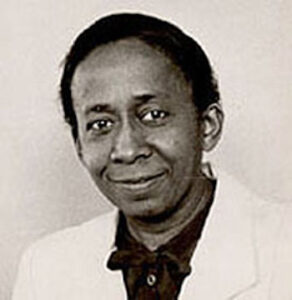
Erna P. Harris
*Erna P. Harris was born on this date in 1908. She was a Black journalist, businesswoman, and activist.
Erna Prather Harris was born in Kingfisher, Oklahoma, to Frances A. "Frankie" and James E. Harris. Her father was a postman. As an admirer of Mahatma Gandhi, he influenced his daughter's later activism. Unlike most men in his community, he did not own a gun, but he routinely opposed the actions of the local Ku Klux Klan.
She attended segregated schools and graduated from Douglass High School in Kingfisher in 1926, as she did not want to continue her education under racial segregation. After graduation, Harris worked as a domestic worker to earn enough money to attend an out-of-state integrated university. She enrolled at Wichita State University, where she majored in journalism and minored in religion, sociology, and Spanish. Harris was a reporter for the college press, The Sunflower, while a freshman. She was the only Black student in the journalism department and its first Black graduate, earning her bachelor's degree in 1936.
After graduating and being unable to find work, Harris opened her newspaper, The Kansas Journal, a successful Black publication until 1939, when she lost her advertisers due to an editorial she wrote opposing the draft. Moving to California, she worked as an editor for the Los Angeles Tribune, writing articles about racist policies such as segregation of blood supplies, immigration, and the internment of Japanese Americans during World War II. She led protests in the 1940s against segregation in the military and favor of conscientious objection.
After being targeted by the FBI and McCarthyism, she criticized the House Un-American Activities Committee's activities. In the 1950s, she relocated to Seattle, where she founded and published a journal, Bias, advocating for peaceful cooperation. She moved to Berkeley, California, and operated a duplication and printing shop until retirement. Harris joined numerous pacifist organizations, including the Fellowship of Reconciliation, the Congress of Racial Equality, the Workers' Defense League, and the Women's International League for Peace and Freedom (WILPF). She served as chair of the Berkeley branch of the WILPF in 1956, was twice appointed as a regional vice president of the national section, and served on the national WILPF executive board. As a member of the WILPF's Civil Rights Committee, she pressed the organization to support school integration after the Brown v. Board of Education ruling and boycotts against companies supporting South African Apartheid.
She was a delegate at three of WILPF's international congresses, in 1956, 1965, and 1971. Harris supported World Federalism in maintaining global peace and attended a US–USSR summit in 1964 to promote cooperation between women. Involved in many issues, she opposed nuclear proliferation, Cuban isolationism, intervention in Latin America, the Vietnam War, California Proposition 6, and discrimination of any kind. Later, Harris became involved in the Consumers' Cooperative of Berkeley and the Gray Panthers.
As a board member of the cooperative, she helped plan the 1978 expansion of the organization to include a credit union, funeral and travel services, and a public housing project. Erna Harris died on March 9, 1995. After she died, the City of Berkeley named a housing project the Erna P. Harris Court in her honor.
To Become a Desktop Publisher
to be a journalist or Reporter